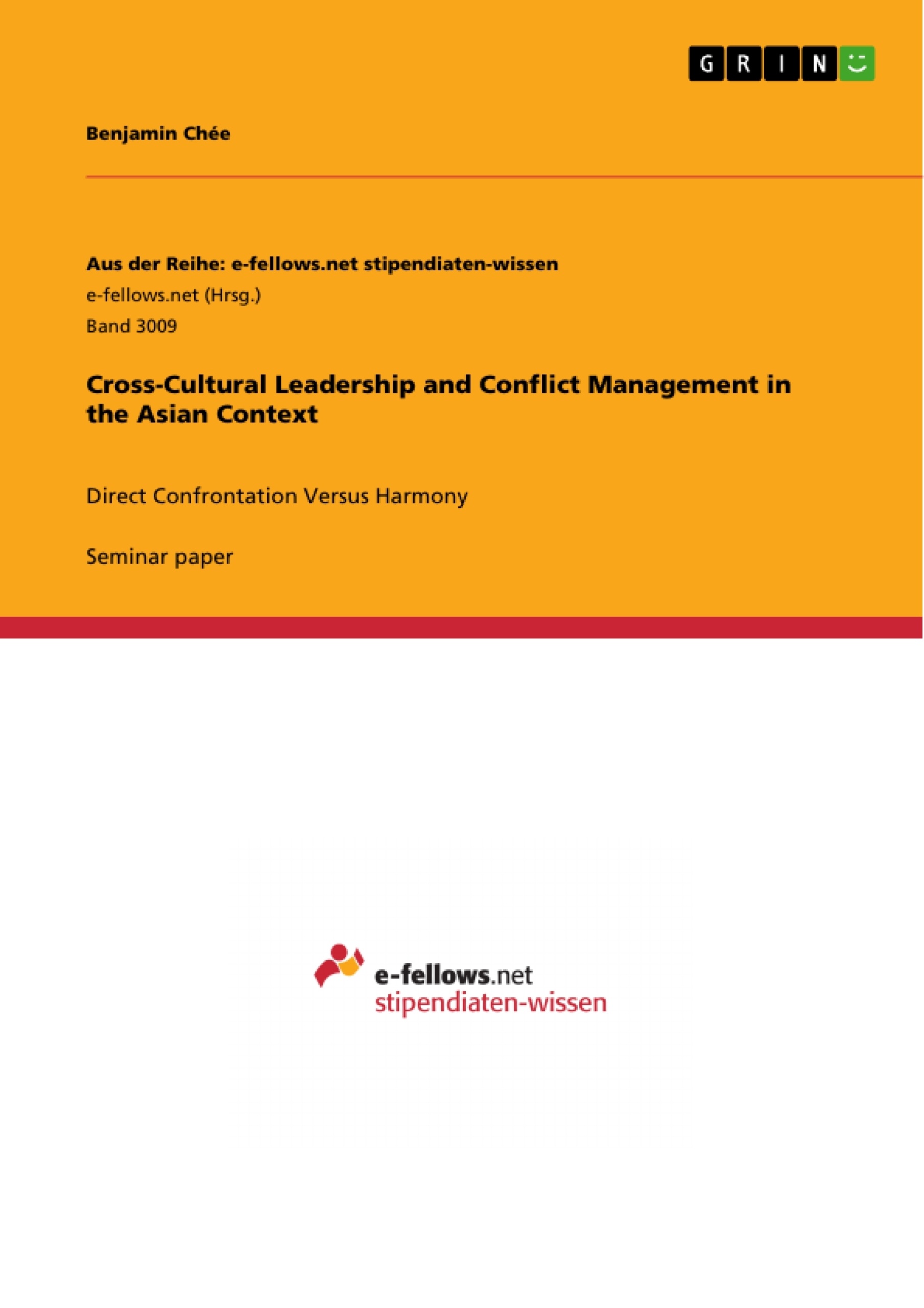In order to find out solutions for leadership and communication conflicts of Western expatriates in Asia, this paper examines cultural characteristics of the Asian, as well as Western, leader-follower construct and how miscommunication could occur. Furthermore, expected leadership styles are explained and which leadership traits and behaviors are desirable from the Asian point of view. Finally, improvement approaches for better cross-cultural conflict management and expatriate leadership in Asia are discussed, while pointing out their limitations.
In an increasingly globalized world, it is more and more common to work in intercultural teams with intercultural leaders. This paper is about the problems that arise when leadership is not meeting the expectations in a particular culture and when conflicts are not managed with regard to the cultural backgrounds.
Asian societies tend to be collectivist cultures, where conflicts are usually avoided and where harmony is the ultimate goal. In Western societies, conflict resolution is usually characterized by direct confrontation. Expectations to a leader also differ: In Asian societies, a paternalistic leadership approach seems to be more common, whereas in Western societies a participative leadership style is used. Awareness is the first step of a successful cross-cultural cooperation, but it does not give instructions how to act in a certain situation.
Inhaltsverzeichnis (Table of Contents)
- Cross-Cultural Conflict Management Challenges
- Cultural Differences: Asian Collectivism and Conflict Avoidance
- Collectivism vs. Individualism
- Conflict avoidance in collectivist Asian societies
- Miscommunication between Cultures
- Language Challenges
- Direct, indirect and non-verbal communication
- Opposing Leadership Expectations
- Paternalistic vs. Participative Leadership Style
- Expected Leadership Traits and Behaviors in Asia
- Discussion of Improvement Approaches for Conflict Management
- Creating Awareness for Different Leadership Expectations and Practical Advice
- Limitations of Approach
Zielsetzung und Themenschwerpunkte (Objectives and Key Themes)
This paper aims to explore the challenges of cross-cultural conflict management in the Asian context, specifically focusing on the differences between Western and Asian leadership styles and communication practices. It examines how these cultural discrepancies can lead to misunderstandings and conflict within intercultural teams.
- Cultural Differences: Collectivism vs. Individualism
- Conflict Management Styles: Direct Confrontation vs. Harmony
- Leadership Expectations: Paternalistic vs. Participative Leadership
- Miscommunication: Language Barriers and Non-Verbal Communication
- Improvement Approaches for Conflict Management
Zusammenfassung der Kapitel (Chapter Summaries)
The paper begins by outlining the challenges of cross-cultural conflict management, particularly focusing on the differences between Asian collectivist and Western individualist cultures. It highlights the importance of understanding these cultural nuances to effectively manage conflict in intercultural settings.
The paper then explores the contrasting leadership expectations in Western and Asian contexts, highlighting the differences between paternalistic and participative leadership styles. It discusses how these contrasting styles can lead to miscommunication and misunderstandings within teams.
Finally, the paper delves into practical approaches for improving cross-cultural conflict management, offering advice for creating awareness and fostering better communication between Western expatriates and their Asian colleagues. It acknowledges the limitations of these approaches and encourages further research into this complex field.
Schlüsselwörter (Keywords)
The primary keywords and focus topics of this text include: cross-cultural conflict management, leadership, cultural differences, collectivism, individualism, communication, conflict avoidance, paternalistic leadership, participative leadership, power distance, and cultural awareness.
Frequently Asked Questions
What are the main cultural differences in conflict management between West and East?
Western societies often prefer direct confrontation for resolution, while Asian societies tend to be collectivist, prioritizing harmony and conflict avoidance.
How do leadership styles differ in the Asian context?
In Asia, a paternalistic leadership approach is common, whereas Western leadership is typically more participative.
What causes miscommunication in intercultural teams?
Miscommunication arises from language barriers, as well as differences in indirect and non-verbal communication styles.
What traits are expected from a leader in Asia?
Desirable traits often include maintaining group harmony, acting as a father-figure, and respecting the hierarchical power distance.
How can Western expatriates improve their leadership in Asia?
The first step is cultural awareness, followed by adapting communication strategies and understanding local expectations regarding hierarchy and decision-making.
- Arbeit zitieren
- Benjamin Chée (Autor:in), 2017, Cross-Cultural Leadership and Conflict Management in the Asian Context, München, GRIN Verlag, https://www.grin.com/document/457218



